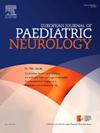Education and participation in children and adolescents with Duchenne muscular dystrophy in Switzerland
IF 2.3
3区 医学
Q3 CLINICAL NEUROLOGY
引用次数: 0
Abstract
Quality of life in Duchenne muscular dystrophy has been reported to be negatively affected by the lack of qualifying education and the lack of opportunities for participation in leisure activities. Two thirds of patients with Duchenne muscular dystrophy have cognitive and/or psychiatric problems. Thus, we conducted a survey study on mobility, school problems, executive functions, social participation and quality of life in young patients in Switzerland.
We contacted 60 male patients with Duchenne muscular dystrophy aged 8–18 years through the Swiss Registry for Neuromuscular Disorders. Mobility, school problems and social participation in leisure activities were assessed with a self-constructed questionnaire. Quality of life and executive function were assessed using KIDSCREEN-10 and BRIEF scores, respectively.
Out of 60 dispatched surveys, 67 % were filled out and included. Approximately half of the participants went to a special needs school, and 83 % rated their overall quality of life as good. We did not find a correlation between mobility and quality of life, whereas more social participation was correlated with higher quality of life. Furthermore, patients with more difficulties in executive functions showed less participation and lower quality of life.
These results underline the need for neuropsychological and adapted assistance in patients with Duchenne muscular dystrophy to facilitate education and social participation.
瑞士杜氏肌萎缩症儿童和青少年的教育和参与
据报告,杜兴肌萎缩症患者的生活质量由于缺乏合格的教育和缺乏参加休闲活动的机会而受到不利影响。三分之二的杜氏肌营养不良患者有认知和/或精神问题。因此,我们对瑞士年轻患者的行动能力、学校问题、执行功能、社会参与和生活质量进行了调查研究。我们通过瑞士神经肌肉疾病登记处联系了60名8-18岁的杜氏肌营养不良症男性患者。以自编问卷评估活动能力、学校问题及休闲活动的社会参与。生活质量和执行功能分别使用KIDSCREEN-10和BRIEF评分进行评估。在60份派出的调查中,67%的人填写并包括在内。大约一半的参与者去了特殊需要学校,83%的人认为他们的整体生活质量很好。我们没有发现流动性和生活质量之间的相关性,而更多的社会参与与更高的生活质量相关。此外,执行功能困难较多的患者参与程度较低,生活质量较低。这些结果强调需要神经心理学和适应援助患者杜氏肌营养不良症,以促进教育和社会参与。
本文章由计算机程序翻译,如有差异,请以英文原文为准。
求助全文
约1分钟内获得全文
求助全文
来源期刊
CiteScore
6.30
自引率
3.20%
发文量
115
审稿时长
81 days
期刊介绍:
The European Journal of Paediatric Neurology is the Official Journal of the European Paediatric Neurology Society, successor to the long-established European Federation of Child Neurology Societies.
Under the guidance of a prestigious International editorial board, this multi-disciplinary journal publishes exciting clinical and experimental research in this rapidly expanding field. High quality papers written by leading experts encompass all the major diseases including epilepsy, movement disorders, neuromuscular disorders, neurodegenerative disorders and intellectual disability.
Other exciting highlights include articles on brain imaging and neonatal neurology, and the publication of regularly updated tables relating to the main groups of disorders.

 求助内容:
求助内容: 应助结果提醒方式:
应助结果提醒方式:


